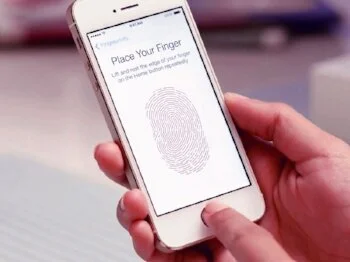Is your fingerprint the golden ticket for police?
By Bryanna Gutierrez and Ristenpart Law
In 2014, a small circuit court judge in Virginia Beach issued a decision which is quickly being adopted by courts across the country. The defendant, Charles Baust, was accused of assaulting and strangling his girlfriend. The girlfriend told police that Baust had a video recorder in the room where the assault took place and that the images were relayed to Baust’s cellphone. Baust’s cellphone was locked by fingerprint and passcode. The State filed a motion to compel Baust to give up his passcode and use his fingers to unlock the phone. The judge granted the State’s motion in part, allowing police to force Baust to use his finger to unlock the phone, but denied compelling Baust to tell the police his passcode (Commonwealth of Virginia v. David Charles Baust, 2014).
Why is forcing someone to unlock their phone with the fingerprint acceptable, but not forcing them to give up their passcode? The court in Commonwealth of Virginia v. David Charles Baust, hinged the decision on the word “testimonial.” The Fifth Amendment to the U.S. Constitution protects all of us from self-incrimination. An act is "testimonial" when the accused is forced to reveal his knowledge of facts relating him to the offense, or share his thoughts and beliefs with the government. The court reasoned that forcing Baust to disclose his passcode was testimonial as it was his knowledge. In contrast, the fingerprint of the defendant, if used to access his phone, is non-testimonial and does not require the defendant to "communicate any knowledge" at all.
“Unlike the production of physical characteristic evidence, such as a fingerprint, the production of a password forced the defendant to disclose the contents of his own mind.”
Historically, courts have ruled that physical characteristics are not protected by the Fifth Amendment. The United States Supreme Court has repeatedly decided that the Fifth Amendment privilege offers no protection against compulsion to submit to fingerprinting, photography, or measurements, to write or speak for identification, to appear in court, to stand, to assume a stance, to walk, or to make a particular gesture.
However, legal experts argue that providing a fingerprint to open access to a phone can be self-incriminating. In California in 2015, U.S. magistrate Judge Alicia Rosenberg approved a warrant that forced defendant Paystar Bkhchadzhyan to unlock her phone with the touch ID for the FBI. The judge rejected her attorneys argument that she was being forced to testify “without uttering a word” as unlocking her phone was a form of authentication of its contents.
In Illinois 2016, a federal judge denied the government’s blanket request for a warrant to force all individuals in a given location to use their fingerprints to unlock Apple devices in the area. An Illinois magistrate Judge, David Weisman, determined that the government had not presented sufficient evidence for the request to justify Fourth Amendment (which protects against unreasonable search and seizures) intrusions. The judge further determined that although a fingerprint is not itself testimony, that it is a “production of information” that results from a person to unlock a device with a finger could be deemed incriminating and accordingly could violate the Fifth Amendment against self-incrimination.
The problem is that the courts are trying to apply a 225-year-old law to the new and rapidly transforming area of technology and privacy law. The Founding Fathers did not draft our amendments with the idea that finger scans would grant government access to all aspects of your life contained in a cellphone. Thus far, the courts have upheld that the Fifth Amendment does not protect people’s right against self incrimination by compelling them to unlock their phones with their fingerprints.
However, opponents have argued that unlocking a phone is incriminating testimony as it requires a user to authenticate the contents of the device. Furthermore, opponents have further argued that trying to take an originalist approach by trying to apply the law exactly as it was intended at its creation, may not be all that reasonable as the framers of the Constitution could not have possibly made the law with the thought in mind that over 200 years later in a rapidly changing technological society phones would be unlocked with a fingerprint scan.
What to do in this situation:
The best answer is to simply only use a pass code instead of the touch ID to unlock your phone. Every phone is capable of turning off touch ID. If typing in a pass code each time is not convenient, shutting down your Iphone completely and then restarting your phone will require your pass code immediately rather than allowing the fingerprint scan to unlock it. Additionally, if your Iphone is not unlocked for 48 hours or after five bad attempts, it will automatically require the pass code rather than the fingerprint scan.

